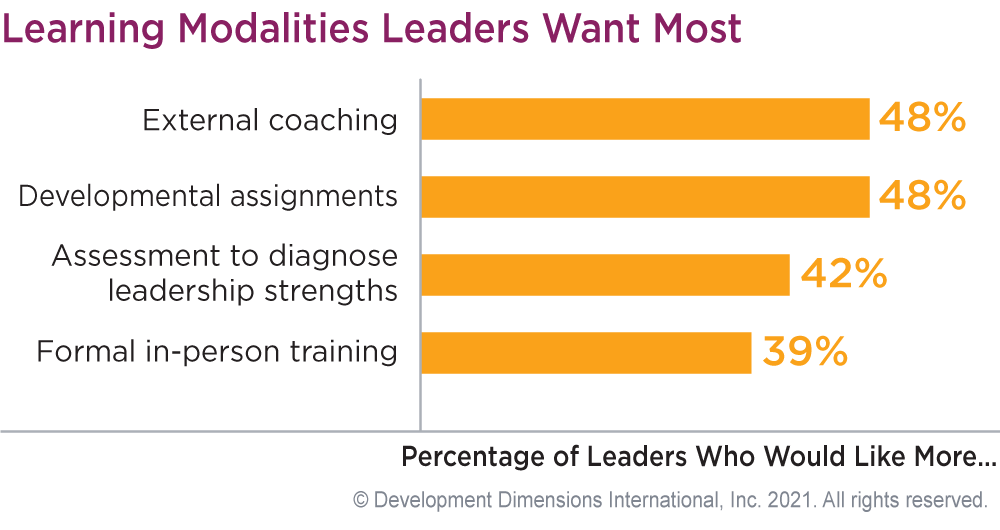While there’s always been a need for companies to transform to compete and grow, the pandemic pushed many companies to make quick transformations to survive. Considering that most transformations fail, what separates successful transformations from failures? Without leaders setting the strategic direction, operationalizing decisions, and energizing the workforce, successful transformation is not possible. So, why invest in leadership development? As the pandemic revealed, it’s critical to have leaders with the core skills ready now to help your organization pivot.
Leadership Development Done Right
Before diving into the benefits of leadership development, what does “leadership development done right” really mean?
Here are characteristics of successful leadership programs:
- It’s more than a workshop: Leadership development is not “one and done.” Done right, it is a journey of learnings that helps leaders grow continuously over time. It’s a mix of both macro and micro learning to build skill and engage your leaders.
- It meets leaders during their time of need: Your program needs to be highly relevant and answer the challenges that your leaders have right now. Why? Leadership development is most effective when people get the right development for the right moment. Whether they are having a tough conversation with a team member or changing roles, leaders need development to help them face what they’re dealing with in the moment.
- It’s set up to work the way your people work: With many people working remotely or hybrid, your leadership development programs should be set up to utilize the virtual classroom. And remember: the virtual classroom is not a webinar; it offers all the experiences of an in-person classroom, without physical handshakes and travel costs.

- It considers how your leaders like to learn: Give your leaders their development in the training types they want most. What’s clear is that leaders prefer a blend of modalities, including a mix of classroom learning with self-directed options and development assignments.
- It has proven impact: During the planning phases of your program, consider how you will measure the impact of your leadership development program and prove ROI.
- It allows time for practice: An effective leadership program goes beyond theory. Ensure there is plenty of time for skill practice in a safe space with peers and on the job.
- It’s personalized: Give leaders access to self-insight tools, like assessments, so they can identify strengths and gaps. Then allow them to pick development resources that match where to improve.
Benefits of Investing in Leadership Development
The most important goal of leadership development is to change behavior. Leaders must identify their deficits and derailers. They must do things differently and develop new skills. When behaviors change, business benefits emerge. Valuable outcomes such as increasing revenue, changing culture, or leading transformation start with leaders who have the skills to take the right actions.
Companies that invest in their leaders can expect to become more competitive, better able to attract and retain talent, and more likely to have long-term success.
Creating a Competitive Edge
To put it simply, companies with effective leadership development programs have higher performing leaders and teams than their competitors. According to our research on the positive impact of leadership development, companies with effective leadership development programs:
- increase productivity by an average of 36%
- increase operational efficiency by an average of 42%
- improve work quality by an average of 48%
Think about it: for companies to be competitive, leaders must be able to move quickly, pivot, forecast, problem solve, coach, communicate, delegate, and more. Leaders who have honed these skills give their companies a key competitive advantage, especially during tumultuous times. For example, during the pandemic, we saw leaders with the following capabilities help their organizations adapt and excel:
- Leaders who were comfortable taking some calculated risks.
- Leaders who were skilled at empowering their teams to try something different.
- Leaders with financial and business acumen to analyze the situation and find unique levers to turn the business around.
It is essential for leaders to not only be able to adapt to change, but to lead it. They must do the right things at the right moments in the increasingly complex and ever-changing global economy.
Attracting and Retaining Talent
The research has shown over and over, that employees value meaningful, purposeful work and company culture above salary. But do you know what employees want even more than purpose, culture, and compensation? They’re looking for a company that’s invested in helping them learn and develop professionally. A well-established leadership development program is a selling point that can help your company attract and retain talent.
In addition, great leaders are upskilled in the interviewing skills necessary to provide an experience that makes candidates want to work for your organization. There are countless stories of hiring managers who ruin their company’s reputation by conducting a poor interview. When candidates feel hiring managers say inappropriate or insensitive comments during an interview, they may take their concerns to social media. This can deeply impact your company’s reputation, which can be hard to mend.
Leadership training can also be crucial to retaining employees and keeping turnover low. Our research shows that companies with effective leadership training programs see an average decrease in turnover of 77%.
What’s more, when leaders have the skills to inspire, engage, and connect with their teams, employees are more likely to be engaged with each other and their role—and find purpose in the work they do. Teams who work effectively together also contribute to building a culture of trust. Organizations with high employee engagement and well-functioning teams can expect to see their retention rates rise.
Remember: it’s often much less expensive to develop, coach, and promote internally than it is to hire externally. An investment in leadership development training means upskilling your talent for short- and long-term benefits.
Lasting Impact
How does leadership development impact your business over the long term? To answer this question, think about the major disruptors that have impacted businesses in recent years. Globalization. Digitization. A global pandemic. Remote and hybrid work. The rising importance of environmental, social, and corporate governance (ESG).
If leaders aren’t ready now, they aren’t going to be ready to help their companies survive the next great disruption either. Organizations need a strong bench to ensure longevity and success. The longer they put off investing in the development of leaders, the more likely their leaders are to fail when that next disruption hits.
But what if leaders are set up for success, with the skills to lead change and build resilience? If your leaders are developed to succeed, even when times are tough, your company will be more likely to survive and stay ahead of the competition. Investing in leadership development is critical for your company’s lasting success.
Leadership Development Is Life-Changing
Leadership development done right is certainly impactful for organizations. But it can also be life-changing at the individual level.
We’ve heard countless stories from clients and associates over the years about how becoming a better leader has changed lives. At a recent industry conference, an attendee shared what they learned about core skills during leadership training 15 years ago. The attendee recited the five most important principles from that training and how they still use them regularly during interactions with friends, family, and colleagues. They said these skills made leadership—and life—easier.
Learn more about DDI’s leadership development solutions.
Verity Creedy is a director in DDI’s product management team. Usually living in London, Verity has spent time working at five different DDI offices, including US Headquarters.
Chrys Gerokonstantis is a leadership consultant at DDI. When he's not busy connecting organizations with their next steps in leadership development, you'll most likely find him studying psychology, watching football, and boxing a heavy bag!
Topics covered in this blog

